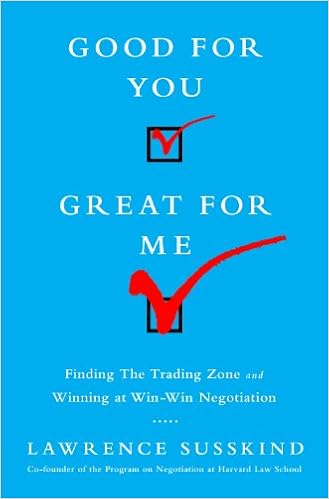Consider the following examples. Mr. Bigshot is the CEO of a large company. He is under substantial pressure from his Board of Directors to increase profitability in the near term and increase market share in the long term. He faces opposition at every turn. Most of his efforts to reform long-standing operating procedures are being opposed by department and division heads. He wants to look tough to impress his Board, but the only way he can come up with to push his agenda is to replace people who don't do what he wants. Now he faces a backlash. Efforts to force long-time partners in the company's "supply chain" to accept new ground rules, have also backfired. If the problems he faces were framed purely in organizational development terms, he might think about hiring a management consultant, but the notion that he might need to improve his (and his organization's) informal problem-solving capabilities is the farthest thing from his mind.
Here's a second example. The head of a well-know multinational agency has been trying for several years to get her organization to embrace sustainable development as part of their mission. At one level, everyone agrees. But, whenever she suggests that this means altering the agency's priorities, shifting the allocation of financial resources and involving long-time critics in redefining the agency's mission, a torrent of tacit and explicit opposition emerges. Endless rounds of one-on-one and group conversation have had no effect. Ms. Agency Leader might go along with hiring a strategic planning consultant, but she is blissfully unaware that both she and her organization probably need help developing their informal problem-solving capabilities.
One explanation for why these two "leaders" are unlikely to take advantage of professional mediation, facilitation or other informal problem-solving assistance is that they don't want to appear weak (to the people to whom they are accountable). They feel obliged to demonstrate that they can handle whatever adversity comes their way. But, that can't be right. Public and private sector leaders are often in a big hurry to hire consultants and expert advisors. Admitting that they don't know what they need to know, can make a leader look smart; so, why the resistance to hiring informal problem-solving help?
A second explanation is that they aren't aware that such expertise is available. It may be that they don't realize that informal problem-solving opportunities are embedded in every conflict situations. They may be unaware there are readily available advisors and intermediaries who can help them avoid unnecessary conflict, engage in collaborative problem-solving and build consensus.
A third explanation is that the providers of informal problem-solving assistance may not be good at
marketing their services. Indeed, this is probably true. A great many skilled mediators don't know how to describe what they do in ways that connect with what leaders of the sort mentioned above think they need. Too many dispute resolution professionals don't work on building long-term relationships with potential clients. They can't expect someone to find them in a moment of crisis. They don't invest enough time putting contracts in place so that they can get to work immediately when informal problem-solving help would be useful.
Finally, informal problem-solving experts may not be pricing their services correctly. Some are charging too little, I think, and some are charging too much. Leaders in both the public and private sector attach importance to professional services for which they pay enough to notice. On the other hand, exorbitant prices mean that informal problem-solving services will be used far too infrequently. Also, performance-based methods of payments ought to be possible (which is something that most mediators have resisted for fear that an a priori commitment to getting agreement is in appropriate in situations where no agreement might be an appropriate outcome). And, service bundles also ought to be up for discussion. For example, training and organizational capacity-building should be part of annual retainers that include a certain number of hours of consulting services in moments of need.
Informal problem-solving is a potential growth industry. However, there are three important considerations that providers of these services ought to keep in mind. First, trust is absolutely crucial. If potential clients are worried that informal problem-solving advisors don't appreciate the pressures they are under, can't guarantee confidentiality or have possible conflicts of interest, they won't seek their help. Second, specialized knowledge is crucial. Clients need to be convinced the informal problem-solving advisors are entirely familiar with what's going on in their"sector." They are not interested in general "process" advice, they want help generating workable solutions. While service providers should not advocate a specific solution in each situation, they should be able to generate an inventory of numerous ideas that have worked in similar situations. Also, leaders are looking for advisors who have the ability to improvise. They don't want informal problem-solvising assistance from advisors who are "selling" an inflexible method. They need help from advisors who can adapt.
Informal problem-solving can add value in almost any situation. We need to make it easy for leaders in both public and private organizations to seek informal problem-solving assistance on a regular basis.




